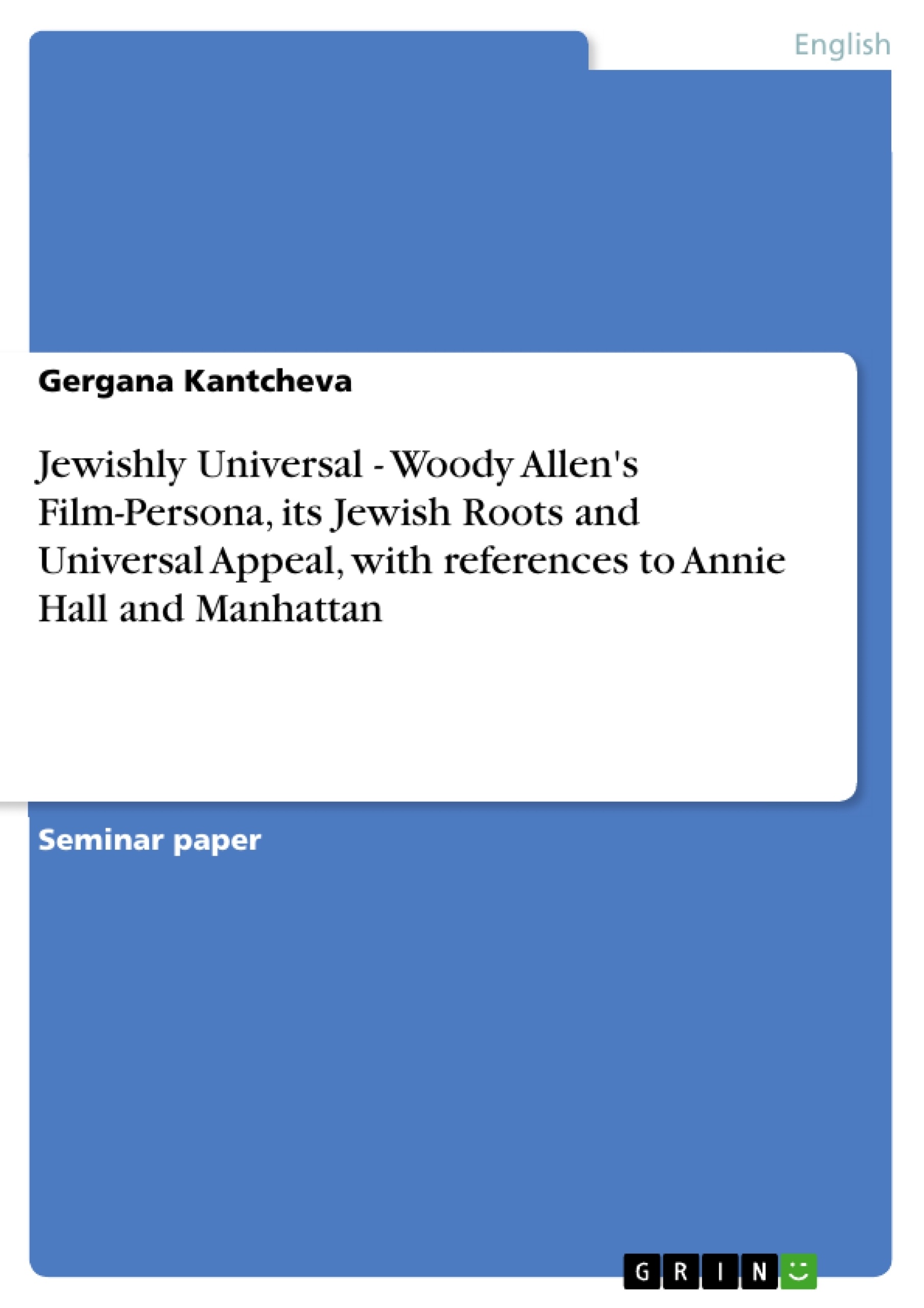Woody Allen, known as the “Intellectual” among American filmmakers, is
one of the most productive Jewish artists of our time. Never limiting himself
on just one genre, he has entertained audiences with humorous one-liners,
stand-up routines, comic prose, plays, screenplays, acting roles, and film
direction for more than half a decade. His self-mocking style, frequent triple
involvement (writer, director, actor) in his films and casting of his real life
lovers (e.g. Diane Keaton) as his character’s film lovers, have led to a
diffusion of Allen the private person, Allen the public person and the so
called “Allen persona”, a type also known as Stadtneurotiker.
Allen, born Allan Stewart Konigsberg, has often denied (in
interviews) that Jewishness plays a major role in his work, other than just
simply being a part of himself. “It’s not on my mind; it’s not part of my
artistic consciousness. Of course, any character I play would be Jewish, just
because I’m Jewish.”1 This claimed disinterest and his often negative and
critical depiction of Jewish characters and habits has led to him being
labeled as a self-hating Jew. Nevertheless, many critics argue that the Allen
film-persona and Allen’s humor have their roots in an old Jewish literary
and comedic tradition and the central concept of the schlemiel as hero,
which he has adapted to his individual circumstances - late Twentieth
century, New York, English etc. - and successfully transferred to the film
medium.
Although, as already mentioned, Woody Allen explores very
different genres, one major characteristic of his work is “the persistence of
the character whose role Woody Allen performed himself most of the time
but had sometimes interpreted by other actors: his persona.”2 [...]
1 Allen as quoted by Marie-Phoenix Rivet, “Woody Allen: The Relationship Between the
Persona and the Author” in King, ed. Woody Allen. A Casebook, p. 27
2 Rivet, p. 23
Table of Contents
- INTRODUCTION
- THE JEWISH CONNECTION
- The Schlemiel
- Jewish Humor
- THE STADTNEUROTIKER-TYPE
- TWO STADTNEUROTIKER IN NEW YORK
- Annie Hall's Alvy Singer
- Manhattan's Isaac Davis
- CONCLUSION
Objectives and Key Themes
This paper aims to explore the Jewish influences on Woody Allen's film-persona, focusing specifically on his use of the schlemiel character and its relationship to Jewish humor. The paper also examines Allen's Stadtneurotiker-type, comparing and contrasting the characters of Alvy Singer (from Annie Hall) and Isaac Davis (from Manhattan).
- The schlemiel as a central figure in Jewish literary and comedic tradition
- The relationship between Allen's film-persona and the concept of the Stadtneurotiker
- The universal appeal of Allen's characters despite their Jewish roots
- The specific characteristics of Jewish humor as used by Allen
- The outsider perspective of Allen's characters as a reflection of his own experiences
Chapter Summaries
The paper begins by introducing the schlemiel character, a figure often associated with Jewish literature and comedy. The first chapter explores the schlemiel's role as a hero in the work of various Jewish writers, including Isaac Bashevis Singer, Saul Bellow, and Bernard Malamud. It examines the schlemiel's characteristics, particularly his propensity for misfortune and his ironic outlook on the world.
The second chapter delves deeper into the concept of Jewish humor, highlighting its key features and demonstrating how Allen utilizes it in his work. It discusses the importance of self-mockery, wordplay, and the depiction of everyday experiences in Jewish humor.
The paper then shifts its focus to the Stadtneurotiker-type, a term that has been used to describe Allen's film-persona. It explores the defining characteristics of this type, including its neuroticism, its intellectualism, and its tendency to be an outsider. The chapter also examines the role of Jewishness in shaping the Stadtneurotiker.
Finally, the paper delves into two specific examples of Allen's Stadtneurotiker characters: Alvy Singer from Annie Hall and Isaac Davis from Manhattan. It compares and contrasts these characters, highlighting their similarities and differences, and analyzing how Allen uses them to explore the themes of love, relationships, and the search for meaning in a complex world.
Keywords
The key concepts explored in this paper include the schlemiel, Jewish humor, the Stadtneurotiker-type, Woody Allen, film-persona, Jewish roots, universal appeal, outsider perspective, and the characters of Alvy Singer and Isaac Davis.
Frequently Asked Questions
What is the "Allen persona" or "Stadtneurotiker"?
It is a specific character type created by Woody Allen—intellectual, neurotic, and often an outsider—frequently appearing in films like "Annie Hall" and "Manhattan."
How does Jewish humor influence Woody Allen's work?
His humor is rooted in Jewish traditions of self-mockery, irony, and wordplay, often centered around the "schlemiel" character type.
What is a "schlemiel" in the context of Woody Allen?
A schlemiel is a traditional Jewish figure characterized by misfortune and awkwardness, which Allen adapted to a modern New York setting.
Why is Woody Allen sometimes labeled a "self-hating Jew"?
Some critics use this label due to his often critical or negative depiction of Jewish habits and characters in his films.
What are the main differences between Alvy Singer and Isaac Davis?
The paper compares these two versions of the Allen persona, looking at how they navigate love and meaning in the urban landscape of New York.
- Citation du texte
- Gergana Kantcheva (Auteur), 2003, Jewishly Universal - Woody Allen's Film-Persona, its Jewish Roots and Universal Appeal, with references to Annie Hall and Manhattan, Munich, GRIN Verlag, https://www.grin.com/document/22721



